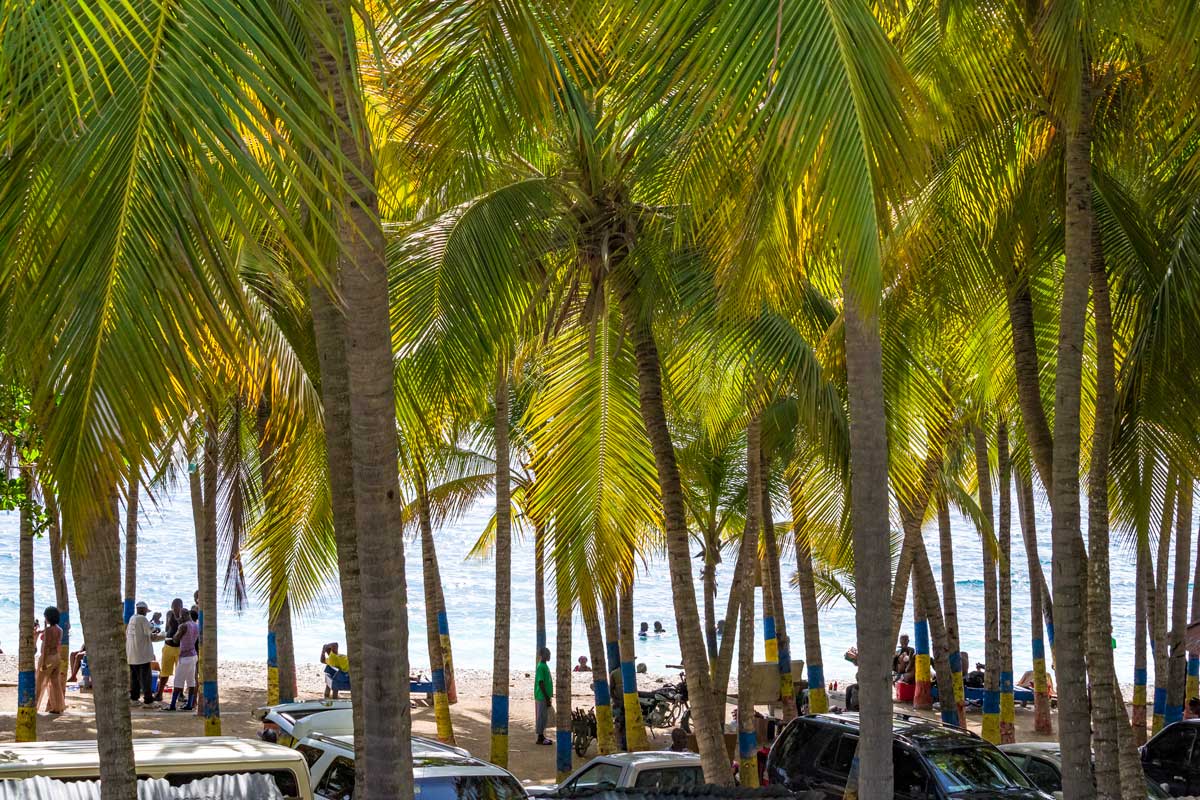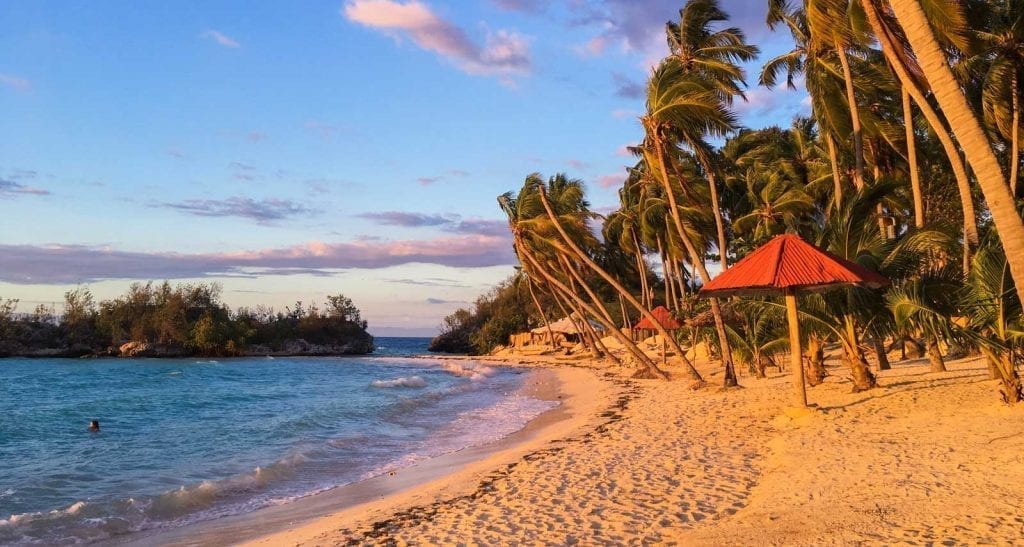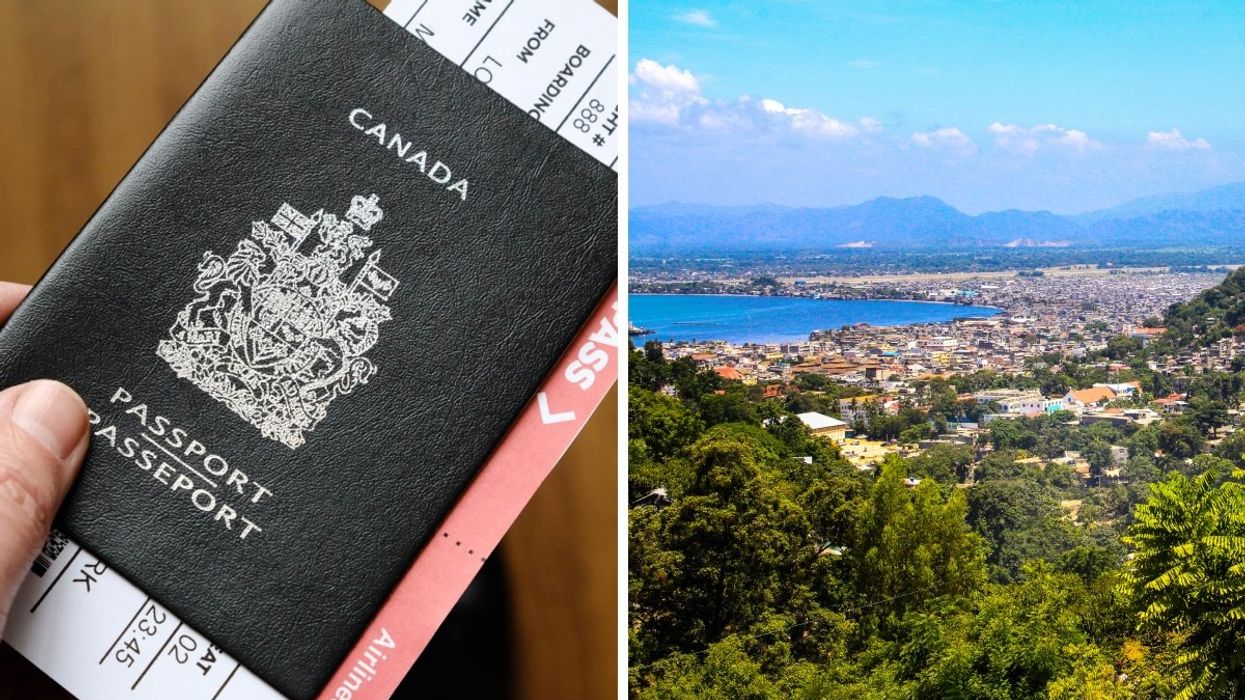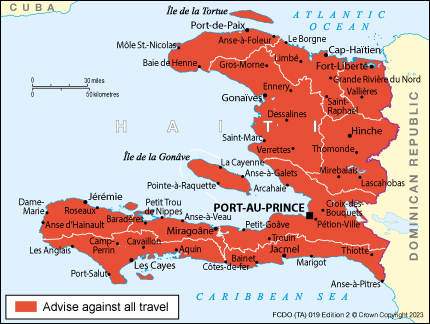Language selection
Canada's response to the crisis in haiti.
On March 3, 2024, the government of Haiti declared a state of emergency in Ouest Department, including Port-au-Prince , in response to gang violence and the deteriorating security situation. A nighttime curfew is in place, and the border with the Dominican Republic is closed.

Key information for Canadians
Emergency contact information for canadians.
Canada is aware that the situation could be challenging and remains committed to provide consular assistance and support. If you are a Canadian in Haiti and need emergency consular assistance, you can reach Global Affairs Canada's Emergency Watch and Response Centre directly and/or via the Embassy of Canada to Haiti, in Port-au-Prince , Haiti, whichever channel of communication is easier to access.
At any time, the Emergency Watch and Response Centre in Ottawa can be reached at:
- Telephone: +1 613‑996‑8885 (collect calls are accepted where available)
- Email: [email protected]
- SMS: +1 613-686-3658
- WhatsApp: 613-909-8881
- Signal: + 1-613-909-8087
- via Telegram at Canada Emergency Abroad
The Embassy of Canada to Haiti, in Port-au-Prince , can be reached at + 011 (509) 2-812-9000 or by e-mail at [email protected] .
We strongly encourage Canadians in Haiti to sign up with the Registration of Canadians Abroad service to receive important information about the situation.
Travel advice and advisories - Haiti
Travel advice, passport and entry requirements, health and safety information, and more.
Information for Canadians citizens and permanent residents who want to leave Haiti
Canadian citizens, permanent residents of Canada and their immediate eligible family members who wish to leave Haiti should do so now. Canadian citizens, permanent residents of Canada and their immediate eligible family members wishing to leave Haiti should:
- apply for a travel document as soon as possible, if they do not currently have valid documents
- sign up with the Government of Canada’s Registration of Canadians Abroad service to receive important information about available assistance
- contact Global Affairs Canada’s Emergency Watch and Response Centre to discuss your situation
Assisted departure operations are bringing Canadian citizens, permanent residents and eligible family members from Port-au-Prince to a secondary safe location and then onward to Montreal via a chartered plane.
In line with previous assisted departures, the chartered flights to Canada are at the traveller’s own expense, priced consistently with the average cost of similar commercial flights. Financial assistance, in the form of private funds transfers and emergency loans, is available to those in need.
Political situation
Canada remains concerned about the humanitarian and security situation in Haiti and calls on all parties to work towards a return to stability. Canada welcomes the news of a political agreement among Haitian stakeholders that was reached on March 11, 2024. Canada hopes signatories to this agreement will quickly establish the Transitional Presidential Council and a transitional government who will work together to restore security, law and order and democracy in Haiti.
Canada will continue to engage with Haitian stakeholders, CARICOM and international partners to support the work towards the implementation of this agreement.
X (Twitter)
- Embassy of Canada in Haiti
- Travel.gc.ca - Travel advice from the Government of Canada
- Canada’s Foreign Policy - Global Affairs Canada
- Canada’s International Development - Global Affairs Canada
- Canada’s International Trade - Global Affairs Canada
- Embassy of Canada in Haiti: @CanEmbHaiti
- Travel.gc.ca: @TravelGoC
- Foreign policy: @CanadaFP
- Development: @CanadaDev
- International trade: @CanadaTrade
Related links
- Canada and Haiti
- Canadian Sanctions Related to Haiti
Thank you for your help!
You will not receive a reply. For enquiries, please contact us .
Situation in Haiti April 5, 2024
U.s. citizens in haiti, update april 12, 2024, information for u.s. citizens in the middle east.
- Travel Advisories |
- Contact Us |
- MyTravelGov |
Find U.S. Embassies & Consulates
Travel.state.gov, congressional liaison, special issuance agency, u.s. passports, international travel, intercountry adoption, international parental child abduction, records and authentications, popular links, travel advisories, mytravelgov, stay connected, legal resources, legal information, info for u.s. law enforcement, replace or certify documents.
Before You Go
Learn About Your Destination
While Abroad
Emergencies
Share this page:
Travel Advisory July 27, 2023
Haiti - level 4: do not travel.
Last Update: Updated to reflect the Ordered Departure of non-emergency U.S. government personnel and eligible family members for Embassy Port-au-Prince.
Do not travel to Haiti due to kidnapping, crime, civil unrest, and poor health care infrastructure. On July 27, 2023, the Department of State ordered the departure of family members of U.S. government employees and non-emergency U.S. government employees. U.S. citizens in Haiti should depart Haiti as soon as possible by commercial or other privately available transportation options, in light of the current security situation and infrastructure challenges. U.S. citizens wishing to depart Port-au-Prince should monitor local news and only do so when considered safe.
Country Summary : Kidnapping is widespread, and victims regularly include U.S. citizens. Kidnappers may use sophisticated planning or take advantage of unplanned opportunities, and even convoys have been attacked. Kidnapping cases often involve ransom negotiations and U.S. citizen victims have been physically harmed during kidnappings. Victim’s families have paid thousands of dollars to rescue their family members.
Violent crime, often involving the use of firearms, such as armed robbery, carjackings, and kidnappings for ransom that include U.S. citizens are common. Mob killings against presumed criminals have been on the rise since late April. Travelers are sometimes followed and violently attacked and robbed shortly after leaving the Port-au-Prince international airport. Robbers and carjackers also attack private vehicles stuck in heavy traffic congestion and often target lone drivers, particularly women. As a result, the U.S. Embassy requires its personnel to use official transportation to and from the airport.
Protests, demonstrations, tire burning, and roadblocks are frequent, unpredictable, and can turn violent. The U.S. government is extremely limited in its ability to provide emergency services to U.S. citizens in Haiti – assistance on site is available only from local authorities (Haitian National Police and ambulance services). Local police generally lack the resources to respond effectively to serious criminal incidents. Shortages of gasoline, electricity, medicine, and medical supplies continue throughout much of Haiti. Public and private medical clinics and hospitals often lack qualified medical staff and even basic medical equipment and resources.
U.S. government personnel are limited only to the confined area around the Embassy and are prohibited from walking in Port-au-Prince. U.S. government personnel in Haiti are prohibited from:
- Using any kind of public transportation or taxis
- Visiting banks and using ATMs
- Driving at night
- Traveling anywhere between 1:00 a.m. and 5:00 a.m.
- Traveling without prior approval and special security measures in place.
Read the country information page for additional information on travel to Haiti.
The Haitian Ministry of Health and Population (MSPP) has confirmed an outbreak of cholera in the country.
If you decide to travel to Haiti:
- Avoid demonstrations and crowds. Do not attempt to drive through roadblocks.
- Arrange airport transfers and hotels in advance, or have your host meet you upon arrival.
- Do not provide personal information to unauthorized individuals (e.g. people without official uniforms or credentials) located in the immigration, customs, or other areas inside or near any airports.
- If you are being followed as you leave the airport, drive to the nearest police station immediately.
- Travel by vehicle to minimize walking in public.
- Travel in groups of at least two people.
- Always keep vehicle doors locked and windows closed when driving.
- Exercise caution and alertness, especially when driving through markets and other traffic congested areas.
- Do not physically resist any robbery attempt.
- Purchase travel insurance and medical evacuation insurance ahead of time.
- Review information on Travel to High-Risk Areas .
- Enroll in the Smart Traveler Enrollment Program (STEP) to receive Alerts and make it easier to locate you in an emergency.
- Follow the Department of State on Facebook and Twitter .
- Review the Country Security Report on Haiti.
- Prepare a contingency plan for emergency situations. Review the Traveler’s Checklist .
Embassy Messages
View Alerts and Messages Archive
Quick Facts
1 page per stamp
Yes, for stays over 90 days. Foreign passport holders visiting Haiti must pay a tourist fee of $10.00 at the airport
None; however, review current COVID testing and vaccination guidance
Embassies and Consulates
U.S. Embassy Port-au-Prince
Boulevard du 15 October, Tabarre 41, Route de Tabarre Port-au-Prince, Haiti Telephone: +(509) 2229-8000 / 2229-8900 Emergency After-Hours Telephone: +(509) 2229-8000 Fax: +(509) 2229-8027 Email: [email protected]
American Citizen Services Unit office hours are 7:00 a.m. to 3:30 p.m., Monday through Friday. Most routine services require an appointment; visit our Embassy webpage . The Embassy is closed on U.S. and local holidays.
Destination Description
Learn about the U.S. relationship to countries around the world.
Entry, Exit and Visa Requirements
The Government of Haiti requires all non-Haiti citizens age 12 and over entering the country to be fully vaccinated against COVID-19, or to present a negative COVID test. No COVID test or vaccination is required for travelers under the age of 5 .
Requirement for Entry: Passport valid for at least six months from date of arrival. Visit the Embassy of Haiti website for the most current visa information.
HIV/AIDS Restrictions: The U.S. Department of State is unaware of any HIV/AIDS entry restrictions for visitors to or foreign residents of Haiti.
Find information on dual nationality , prevention of international child abduction and customs regulations on our websites.
Safety and Security
Crime: Embassy employees are prohibited from using public transportation and visiting certain areas of Port-au-Prince due to high crime. Political violence and violent crimes are common in Haiti, including murders, kidnappings, robberies, assaults, vehicle break-ins, and home invasions. Travelers are often targeted, followed, and violently attacked and robbed shortly after leaving the Port-au-Prince international airport. For this reason, Embassy personnel are prohibited from traveling in personal vehicles to and from the airport. Also, the Embassy has procedures in place to detect surveillance and deter attacks on its employees.
Labadee, a port near Cap Haitien in the north - only accessible by cruise ship passengers - has private security and lower rates of reported crime. Travelers should exercise heightened precautions,however, due to increasing insecurity nationwide.
Safety Precautions:
- Be careful about providing your destination address in Haiti. Do not provide personal information to unauthorized individuals located in the immigration, customs, or other areas inside or near any airports in Haiti.
- As you leave the airport, make sure you are not being followed. If you notice you are being followed, drive to the nearest police station immediately.
- Be aware of your surroundings.
- Keep a low profile.
- Do not display signs of wealth, such as jewelry or watches.
- Embassy employees are prohibited from visiting banks and using ATMs. U.S. citizens are often followed, attacked and robbed soon after withdrawing money. If you must use an ATM, select one that is out of sight from the general public (such as inside your hotel), and be cautious at all times.
- Do not resist a robbery or car-jacking attempt. Criminals may kill those who resist.
- If a situation makes you feel uncomfortable, leave immediately.
- Be aware: drug traffickers have duped travelers into transporting narcotics aboard on commercial flights.
- Be aware: crime rates tend to go up during holidays, particularly in crowded street festivities.
See the Department of State and the FBI pages for information on scams.
Victims of Crime, Domestic Violence and Sexual Assault: Local authorities are responsible for investigating and prosecuting crimes. Police investigations may not meet U.S. standards and forensic medical services are very basic. While rape kits exist in Haiti, there is generally no capacity to collect or utilize samples for police investigation. Report crimes to the local police at (+509) 3838-1111 or (+509) 3733-3640, then call the U.S. Embassy at (+509) 2229-8000.
See our webpage on help for U.S. victims of crime overseas .
- Help you find appropriate medical care
- Assist you in reporting a crime to the police
- Contact relatives or friends if we receive your written consent
- Explain the local criminal justice process in general terms
- Provide a list of attorneys in Haiti
- Provide information on victim’s compensation programs in the United States
- In cases of destitution, provide an emergency loan for repatriation to the United States and/or limited medical support
- Help you find hotel accommodations and arrange a flight home
- Replace a stolen or lost passport
Demonstrations occur frequently. They may take place in response to political or economic issues, on politically significant holidays, and during international events.
- Demonstrations can be unpredictable, avoid areas around protests and demonstrations.
- Past demonstrations have turned violent.
- Check local media for updates and traffic advisories.
Domestic Violence: U.S. citizen victims of domestic violence are encouraged to contact the Embassy for assistance.
No formal tourism industry infrastructure is in place on any level in most locations. With the exception of Labadee, tourists are participating in activities at their own risk. Emergency response and subsequent appropriate medical treatment is not available in-country. U.S. citizens are encouraged to purchase medical evacuation insurance. See our webpage for more information on insurance providers for overseas coverage
Hurricanes: Hurricane season runs from June 1 – November 30 in the Atlantic. Roads and bridges may become impassible. Poor rescue services and weak infrastructure hamper the government’s ability to respond to storms.
For information on how to prepare and respond to storms and hurricanes:
- https://www.ready.gov/hurricanes
- Haiti Météo website
- Local media broadcasts in Creole or French
- National Oceanic and Atmospheric Administration
- U.S. Federal Emergency Management Agency
Earthquakes: Haiti is prone to earthquakes. For information on what to do before, during, and after an earthquake, visit https://www.ready.gov/earthquakes .
Local Laws & Special Circumstances
Criminal Penalties: You are subject to local laws. If you violate local laws, even unknowingly, you may be expelled, arrested, or imprisoned. Prolonged pre-trial detention is common and prison conditions do not meet U.S. standards. Individuals establishing a business or practicing a profession that requires additional permits or licensing should seek information from the competent local authorities, prior to practicing or operating a business.
Furthermore, some laws are also prosecutable in the United States, regardless of local law. For examples, see our website on crimes against minors abroad and the Department of Justice website.
Arrest Notification: If you are arrested or detained, ask police or prison officials to notify the U.S. Embassy immediately. See our webpage for further information.
Real Estate Investments: Be highly cautious. Property rights are irregularly enforced. Clear title to land is difficult or impossible to obtain. Consult an attorney before signing documents or closing on any real estate transactions. Undeveloped land is vulnerable to legal and physical takeover. Absentee owners may be assaulted by squatters when trying to reclaim their property. Litigation and eviction proceedings can take years. U.S. citizens involved in business/property disputes are sometimes arrested without charge and can spend months or years in pre-trial detention, waiting for their cases to be heard. The Embassy does not attend property dispute hearings but, as above, can assist U.S. citizens who have been arrested.
Firearms and Other Weapons: Possession of firearms, ammunition, and dangerous weaponry is strictly prohibited to any person, unless the individual has a Haitian license or has been specifically authorized by Haitian authorities. In order to bring a firearm into Haiti, an owner must obtain written permission in advance from the Director-General of the Haitian National Police (HNP). Contact the “Centre de Renseignement de la police”/Information Center (CRO) at [email protected] or by telephones at 509-3838-1111 /509-3837-1111/509-3839-1111 for additional information. Travelers caught entering Haiti with any type of weapon, including firearms or ammunitions, will likely face severe penalties, including prison time. U.S.-issued permits allowing an individual to carry weapons are not valid in Haiti. Visit the Department’s Traveling Abroad with Firearms webpage .
Faith-Based Travelers: See the following webpages for details:
- Faith-Based Travel Information
- International Religious Freedom Report – see country reports
- Human Rights Report – see country reports
- Hajj Fact Sheet for Travelers
- Best Practices for Volunteering Abroad
LGBTQI+ Travelers: Anti-LGBTQI+ sentiment exists. While no laws criminalize sexual orientation or consensual same-sex conduct between adults, persons identified as LGBTQI+ may be targeted for harassment, discrimination, or physical attacks. See our LGBTQI+ Travel Information page and section 6 of our Human Rights report for further details.
Travelers with Disabilities: The law in Haiti prohibits discrimination against persons with disabilities, but the law is not enforced. Social acceptance of persons with disabilities in public is not as prevalent as in the United States, however. Expect accessibility to be limited in public transportation, lodging, communication/information, and general infrastructure. Businesses rarely accommodate persons with disabilities and Haitian authorities do not enforce laws mandating public access for the disabled. Sidewalks, when present, are frequently congested by sidewalk commerce and parked cars.
Students: See our Students Abroad page and FBI travel tips .
Women Travelers: Domestic violence and sexual assault are unfortunately common and not always investigated or prosecuted consistently or vigorously. See our travel tips for Women Travelers .
The Government of Haiti requires all non-Haiti citizens age 12 and over entering the country to be fully vaccinated against COVID-19, or to present a negative COVID test.
Medical facilities, including ambulance services, are scarce and generally sub-standard, especially outside the capital. Life-threatening emergencies often require evacuation to a point outside of Haiti by air ambulance at the patient's expense. Lists of doctors, hospitals, and air ambulance services are available at the Embassy website.
There is no functional national emergency services line in Haiti. The Embassy maintains a list of emergency telephone contacts.
Ambulance services may not be reliable in an emergency. Injured or seriously ill travelers may prefer to take a taxi or private vehicle to the nearest major hospital rather than wait for an ambulance. Ambulance services are:
- Not widely available and training and availability of emergency responders may be below U.S. standards.
- Not equipped with state-of-the-art medical equipment.
- Often not staffed with trained paramedics and often have little or no medical equipment.
We do not pay medical bills. Be aware that U.S. Medicare/Medicaid does not apply overseas. Most hospitals and doctors overseas do not accept U.S. health insurance.
Medical Insurance: Make sure your health insurance plan provides coverage overseas. Most care providers overseas only accept cash payments. See our webpage for more information on insurance providers for overseas coverage. Visit the U.S. Centers for Disease Control and Prevention for more information on type of insurance you should consider before you travel overseas.
We strongly recommend supplemental insurance to cover medical evacuation.
Always carry your prescription medication in original packaging, along with your doctor’s prescription. Check with the Haitian Ministry of Public Health to ensure the medication is legal in Haiti.
Vaccinations: Be up-to-date on all vaccinations recommended by the U.S. Centers for Disease Control and Prevention.
Further health information:
- World Health Organization
- U.S. Centers for Disease Control and Prevention (CDC)
Health facilities in general:
- Public medical clinics often lack basic resources and supplies.
- Hospitals and doctors often require payment “up front” prior to service or admission. Credit card payment is not always available.
- Private hospitals usually require advance payment or proof of adequate insurance before admitting a patient.
- Medical staff may speak little or no English.
- Patients bear all costs for transfer to or between hospitals.
- Psychological and psychiatric services are limited, even in the larger cities.
Water Quality
In most areas, tap water is not potable. Bottled water and beverages are generally safe, although you should be aware that many restaurants and hotels serve tap water unless bottled water is specifically requested. Be aware that ice for drinks may be made using tap water.
General Health Language
The following diseases are prevalent:
- Chikungunya
- Use the U.S. Centers for Disease Control and Prevention recommended mosquito repellents and sleep under insecticide-impregnated mosquito nets. Chemoprophylaxis is recommended for all travelers even for short stays.
- There are shortages of food, water, medicine, medical supplies, etc. throughout Haiti.
- Visit the U.S. Centers for Disease Control and Prevention website for more information about Resources for Travelers regarding specific issues in Haiti.
Travel and Transportation
Road Conditions and Safety: Traffic is extremely chaotic throughout the country and is frequently congested in urban areas. Lanes are not marked, and signs indicating the flow of traffic seldom exist. Roads are generally unmarked, and detailed, accurate maps are not widely available. GPS-based systems do usually work accurately, but the lack of road signage makes it hard to determine the indicated route. There are only a handful of stoplights in the country. Pedestrians regularly walk on the side of the road, and animals often dart into traffic. Even though driving is on the right side of the road, large potholes and flooding may cause drivers to swerve unpredictably and dangerously into the opposite lane of traffic. Speeding, aggressive driving, lack of traffic lights and signs, lack of right of way, unlit vehicles, and poor maintenance are the cause of many fatal traffic accidents in Haiti, as are overloaded vehicles on winding, mountainous and degraded roads. Motorcycles weave through traffic at high speeds. Driving under the influence is common at night. Traffic accidents are a major cause of death and injury, and extreme caution should be exercised. Those lacking knowledge of Haitian roads and traffic customs should hire a driver through a tour company or hotel. Heavy rains can cause mudslides and flooding that can quickly make conditions perilous. The Haitian government lacks adequate resources to assist drivers in distress or to clear the road of accidents or broken-down vehicles. If you are involved in an accident, do not expect medical or law enforcement assistance.
Public Transportation: Public transportation consists of “tap-taps” (collective buses), private motorcycles for hire, and public buses and taxis in some cities or inter-city routes. Embassy personnel are prohibited from using any public transportation, and U.S. citizens are advised to avoid doing so due to the risk of crime. There is a significant risk of ejection in any accident, or even rough driving, due to lack of seat belts.
See our Road Safety page for more information.
Aviation Safety Oversight:
The U.S. Federal Aviation Administration (FAA) has assessed the government of Haiti’s Civil Aviation Authority as not being in compliance with International Civil Aviation Organization (ICAO) aviation safety standards for oversight of Haiti’s air carrier operations. Further information may be found on the FAA’s safety assessment page .
Maritime Travel: Mariners planning travel to Haiti should also check for U.S. maritime advisories and alerts . Information may also be posted to the U.S. Coast Guard homeport website , and the NGA broadcast warnings .
For additional travel information
- Enroll in the Smart Traveler Enrollment Program (STEP) to receive security messages and make it easier to locate you in an emergency.
- Call us in Washington, D.C. at 1-888-407-4747 (toll-free in the United States and Canada) or 1-202-501-4444 (from all other countries) from 8:00 a.m. to 8:00 p.m., Eastern Standard Time, Monday through Friday (except U.S. federal holidays).
- See the State Department’s travel website for the Worldwide Caution and Travel Advisories .
- Follow us on Twitter and Facebook .
- See traveling safely abroad for useful travel tips.
Review information about International Parental Child Abduction in Haiti . For additional IPCA-related information, please see the International Child Abduction Prevention and Return Act ( ICAPRA ) report.
Travel Advisory Levels
Assistance for u.s. citizens, learn about your destination, enroll in step.

Subscribe to get up-to-date safety and security information and help us reach you in an emergency abroad.
Recommended Web Browsers: Microsoft Edge or Google Chrome.
Make two copies of all of your travel documents in case of emergency, and leave one with a trusted friend or relative.
Afghanistan
Antigua and Barbuda
Bonaire, Sint Eustatius, and Saba
Bosnia and Herzegovina
British Virgin Islands
Burkina Faso
Burma (Myanmar)
Cayman Islands
Central African Republic
Cote d Ivoire
Curaçao
Czech Republic
Democratic Republic of the Congo
Dominican Republic
El Salvador
Equatorial Guinea
Eswatini (Swaziland)
Falkland Islands
France (includes Monaco)
French Guiana
French Polynesia
French West Indies
Guadeloupe, Martinique, Saint Martin, and Saint Barthélemy (French West Indies)
Guinea-Bissau
Isle of Man
Israel, The West Bank and Gaza
Liechtenstein
Marshall Islands
Netherlands
New Caledonia
New Zealand
North Korea (Democratic People's Republic of Korea)
Papua New Guinea
Philippines
Republic of North Macedonia
Republic of the Congo
Saint Kitts and Nevis
Saint Lucia
Saint Vincent and the Grenadines
Sao Tome and Principe
Saudi Arabia
Sierra Leone
Sint Maarten
Solomon Islands
South Africa
South Korea
South Sudan
Switzerland
The Bahamas
Timor-Leste
Trinidad and Tobago
Turkmenistan
Turks and Caicos Islands
United Arab Emirates
United Kingdom
Vatican City (Holy See)
External Link
You are about to leave travel.state.gov for an external website that is not maintained by the U.S. Department of State.
Links to external websites are provided as a convenience and should not be construed as an endorsement by the U.S. Department of State of the views or products contained therein. If you wish to remain on travel.state.gov, click the "cancel" message.
You are about to visit:
Choose your language

Haiti up close
Entry to Haiti: Visa & Travel Requirements
Boat with Haitian flag on Île-à-Rat (Amiga Island)
Photo: Jean Oscar Augustin
Navigate Haiti's entry process and visa requirements with ease
Haiti is a nation famed for its rich history and stunning beaches, attracts travelers from around the world. Yet, the lack of clear online information, leaves many travelers confused regarding the specific entry requirements and the need for tourist visas, often leading to uncertainty and potential travel complications.
So, what exactly are the visa policies for Haiti, and what should you know before embarking on your journey?
This article is your essential guide, detailing Haiti's visa and travel requirements, including up-to-date vaccination information and safety tips, to help you prepare thoroughly for an unforgettable Haitian experience.

Mountain hiking in Mare à Coiffe, Aquin
Photo: Dyerlin Delva
Visa requirement for tourist
For stays under three months, tourists from most countries, including the U.S., Canada, and Europe, can enjoy Haiti's beauty without the need for a tourist visa. A notable exception applies to nationals from the Dominican Republic, Panama, Colombia, Cuba, Syria, Libya, Vietnam, or Yemen, who must obtain a visa beforehand.
Importantly, upon arrival in Haiti, all tourists are required to pay an entry fee of $10 USD. Please note, this fee must be paid in cash at the airport as credit cards are not accepted. To ensure your entry is as smooth as your flight, keep some cash handy for this fee.
For an extended stay in Haiti
Planning to extend your journey in Haiti beyond 90 days? It's essential to apply for a residence permit. This step is required for all visitors who wish to stay in Haiti for a longer period, or are considering making Haiti their permanent home. Start the application process at one of Haiti's 26 embassies or through any of its 19 consulates abroad.
Remember, you'll need to have a valid passport and all necessary documents as outlined by your nearest Haitian embassy.

Palm trees at Plage Publique, Côte des Arcadins
Photo: Verdy Verna
Prohibited items for travels to Haiti
This includes not only the obvious – firearms, weapons, explosives, drugs, and narcotics – but also materials of a pornographic nature or those considered contrary to good morals. Also, be mindful of the duty-free allowances for tobacco products and alcohol, and for specific details, consult your local Haitian embassy.
To help ensure your journey is hassle-free, our comprehensive What to Pack guide provides all the essential information about what to bring for your trip to Haiti.
Can i bring my pet to Haiti?
Want to bring your furry friend along to Haiti? Absolutely, you can! Just ensure your pet isn't on the endangered species list or subject to international transport restrictions. In Haiti, pets can accompany you either as part of your checked luggage or shipped via cargo. Don't forget the essential paperwork – a travel certificate and a valid medical certificate are a must for your pet's journey. For specific guidelines and any additional requirements, it's a good idea to check with your local Haitian consulate or embassy before travel.

Taptap bus on mountain road
Vaccination requirements for Haiti
Before traveling to Haiti, ensure you are vaccinated against Covid-19, as this is a mandatory requirement. While other vaccinations are optional, remember that Haiti's tropical climate can increase the risk of mosquito-borne infections. To safeguard your health, consider getting vaccinated against tropical diseases like yellow fever and dengue. Make sure you're up to date with routine vaccines for diphtheria, tetanus, chickenpox, and polio.
If your adventure includes exploring rural areas or nature, vaccinations for rabies, Hepatitis, and cholera are recommended. Always check with your local healthcare provider for the latest health risk information and vaccination requirements.
Don't forget to read our article on how to stay healthy and safe while enjoying the beauty of Haiti!
Written by Costaguinov Baptiste.
Published November 2023.
Get to Know Haiti a Little Better
Haitian cuisine: a culinary map of haiti.
Come with us on a lip-smacking journey as we map
What to Pack for Your Trip to Haiti?
Escape the snow and hit the beach with a Caribbean
Experience Haiti Virtually from Your Home
Join us and take a virtual walk through Haiti's forests,
Return to the Motherland
If going back to your ancestral roots is something you
Ten of the Best Books about Haiti
Cosy up with these ten books that explore the fascinating
Getting around Haiti: How to Moto
Want to know how to get around Haiti on a

Great Haitian charities to support (and those to avoid!)
Wondering what is - or isn’t - happening with your
Known Before You Go: Haitian Slang Words & Phrases
Want to sound like a local or impress your Haitian
Hear the Echoes of Wisdom in 12 Haitian Proverbs
Curious about Haiti's ancient wisdom? Explore our article on Haitian
Quiz – How Many Facts about Haiti Do You Know?
Haiti is a country full of rich culture, beautiful people,
Subscribe to our newsletter
Get more travel inspiration, tips and exclusive offers sent straight to your inbox
I would like to get VisitHaiti newsletters in my inbox
Paradise for Your Inbox

Subscribe to our newsletter for the best monthly stories and insider guides about Haiti!
I would like to get Visit Haiti newsletters in my inbox
We’re sorry, this site is currently experiencing technical difficulties. Please try again in a few moments. Exception: request blocked

Create a free account
- Gain access to free articles
- Daily free newsletter(s)
- Ability to comment on most articles
- Build your 3D avatar and gain points
- Everything in the Free plan
- Ad-free reading and browsing
- Unlimited access to all content including AI summaries
- Directly support our local and national reporting and become a Patron
- Cancel anytime.
Forgot my password
Please enter your email and we'll send you a new password request code.
Please complete your profile to unlock commenting and other important features.

, time to level up your local game.
We have a favour to ask.
MTL Blog is looking to transition to a more sustainable future where we are no longer as reliant on advertising revenue. Upgrade now and browse MTL Blog ad-free and directly support our journalism.

This is a Pro feature.
Time to level up your local game with mtl blog pro..
Canada Has Issued A Travel Advisory For This Caribbean Destination Due To A State Of Emergency
"Avoid all travel." ⚠️

A person holding a Canadian passport with a boarding pass tucked inside. Right: A view of the ocean and mountains in the Caribbean.
The Government of Canada has updated its travel advisories list and has included a new destination that Canadian travellers should "avoid" at all costs.
The Canadian government updates its travel advisories list often, allowing Canadians to make informed decisions while travelling outside of Canada. The federal government has four risk levels which include taking normal security precautions (green light), exercising a high degree of caution (yellow light), avoiding non-essential travel (orange light) and avoiding all travel (red light).
The latest update came in on March 4, 2024, at 11:03 p.m. and the Government of Canada has now issued a red light warning for Canadians to avoid all travel to Haiti .
Per the official travel advice and advisory page, Canadian travellers should avoid all travel to Haiti due to "threats posed by kidnapping, gang violence and the potential for civil unrest throughout the country."
The federal government indicated that the security situation in Haiti remains very "volatile." So much so that Canada is urging all travellers to consider leaving the country by commercial means as soon as possible.
Per the travel advisories page, Haiti issued a state of emergency and curfew in Ouest Department, including in Port-au-Prince, in response to gang violence and the "deteriorating security situation."
The state of emergency is expected to last at least 72 hours until the evening of Wednesday, March 6, 2024. Furthermore, a curfew has also been put in place in Ouest Department daily from 6 p.m. to 5 a.m. during the state of emergency.
"You must stay indoors while the curfew is in effect. There are exceptions for certain professions, including medical personnel and journalists carrying official identification," the Canadian government said.
According to the CBC , an attack took place at the Toussaint Louverture International Airport on Monday, March 4, 2024. However, the airport was, in fact, closed at the time, with no passengers present or any flights scheduled to take off.
The CBC said that the airport attack was the biggest one in Haiti's history. "The secretary-general is deeply concerned by the rapidly deteriorating security situation in Port-au-Prince, where armed gangs have intensified their attacks on critical infrastructure over the weekend," said UN spokesperson Stephane Dujarric.
Border closures with the Dominican Republic are also still in effect, per the federal government. In this case, Canadians can only enter and exit Haiti via the Dominican Republic by plane, as sea and land crossings remain closed.
This article's cover image was used for illustrative purposes only.
- Canada Has Updated Its Travel Advisory For France — Here's What You Need To Know ›
- Canada Has Issued Travel Advisories For These High-Risk Holiday Hotspots In Europe ›
- Canada Has Issued Travel Advisories For These 9 Top Tourist Destinations ›
- Canada Has Issued Travel Advisories For These 10 Summer Destinations - MTL Blog ›
Already have an account? Log in
Create an account to keep reading.
1. choose a plan.
Limited access to free articles
Unlimited access to all content, AI summaries, ad-free browsing and directly support our reporting by becoming a Patron 🙏. Cancel anytime.
2. Create your account
Canada has issued travel advisories for these 10 summer destinations, canada has issued travel advisories for these 7 tourist destinations, canada has issued travel advisories for these 7 holiday hotspots, canada has issued travel advisories for these 9 vacation spots, canada has issued travel advisories for these 9 countries, canada has issued travel advisories for these 11 popular vacation spots, canada has issued travel advisories for these 9 vacation hotspots, canada has updated travel advice for ireland after unrest in dublin, canada has issued travel advisories for these high-risk holiday hotspots in europe, what's open and closed over the easter long weekend in montreal, daylight saving time returns this weekend — here's what time clocks spring forward, montreal was ranked among the best cities in the world.

Cookies on GOV.UK
We use some essential cookies to make this website work.
We’d like to set additional cookies to understand how you use GOV.UK, remember your settings and improve government services.
We also use cookies set by other sites to help us deliver content from their services.
You have accepted additional cookies. You can change your cookie settings at any time.
You have rejected additional cookies. You can change your cookie settings at any time.
- Passports, travel and living abroad
- Travel abroad
- Foreign travel advice
Warnings and insurance

The Foreign, Commonwealth & Development Office ( FCDO ) provides advice about risks of travel to help British nationals make informed decisions. Find out more about FCDO travel advice .
FCDO advises against all travel to Haiti
Your travel insurance could be invalidated if you travel against FCDO advice. Consular support is also severely limited where FCDO advises against travel.
FCDO advises against all travel to Haiti due to the volatile security situation. There are currently no British consular officials in Haiti and our ability to provide consular assistance is severely limited and cannot be delivered in person in Haiti.
British nationals may get consular services assistance at our diplomatic mission in the Dominican Republic .
If you choose to travel to or stay in Haiti against FCDO advice, try to avoid all crowds and public events, and take appropriate security precautions.
State of emergency
The government has declared a state of emergency until 3 May, applying to all areas in the Department de l’Ouest. Under the state of emergency, a curfew for citizens will run from 7pm to 6am every day until 3 May.
Before you travel
No travel can be guaranteed safe. Read all the advice in this guide and see support for British nationals abroad for information about specific travel topics.
Follow and contact FCDO travel on Twitter , Facebook and Instagram . You can also sign up to get email notifications when this advice is updated.
Travel insurance
If you choose to travel, research your destinations and get appropriate travel insurance . Insurance should cover your itinerary, planned activities and expenses in an emergency.
Related content
Is this page useful.
- Yes this page is useful
- No this page is not useful
Help us improve GOV.UK
Don’t include personal or financial information like your National Insurance number or credit card details.
To help us improve GOV.UK, we’d like to know more about your visit today. We’ll send you a link to a feedback form. It will take only 2 minutes to fill in. Don’t worry we won’t send you spam or share your email address with anyone.
Your last-minute guide to Monday's total solar eclipse

A total solar eclipse will cross North America on Monday , offering millions a rare opportunity to see afternoon skies temporarily darken as the moon blocks the face of the sun.
Tune into NBC News NOW as Lester Holt hosts a two-hour special at 2 p.m. ET Monday from Indianapolis Motor Speedway.
The eclipse's path fortuitously cuts across Mexico, 15 U.S. states and a small part of eastern Canada. In all other states in the continental U.S., viewers will be treated to a partial solar eclipse, with the moon appearing to take a bite out of the sun and obscuring part of its light.
Here’s everything you need to know about the rare celestial event.
What is a solar eclipse?
Solar eclipses occur when the sun, moon and Earth align. The moon passes between Earth and sun, temporarily blocking the sun’s light and casting a shadow on Earth.
A total solar eclipse is when the moon fully obscures the sun, whereas a partial solar eclipse means it blocks just a portion of the sun’s face.
Solar eclipses occur only with the new moon. Because the moon’s orbit around Earth is tilted, the three bodies don’t always line up in a way that creates an eclipse.
“Imagine if the moon’s orbit were in the plane of Earth’s orbit around the sun — if that were the case, then every new moon, you’d have a total solar eclipse and every full moon, you’d have a lunar eclipse,” Neil DeGrasse Tyson, director of the Hayden Planetarium at the American Museum of Natural History, told NBC News. “So, because things don’t always align, it lends to the rarity of the event and the specialness of the event.”
Where and when will the eclipse be visible?
This year’s eclipse will follow a slightly wider path over more populated areas of the continental U.S. than other total solar eclipses have in the recent past.
NASA estimates that 31.6 million people live within what’s known as the path of totality, where the total solar eclipse will be visible. An additional 150 million people live within 200 miles of the path, according to the agency.
The path travels through Texas, Oklahoma, Arkansas, Missouri, Illinois, Kentucky, Indiana, Ohio, Pennsylvania, New York, Vermont, New Hampshire and Maine. Tiny parts of Michigan and Tennessee will also be able to witness totality if conditions are clear.
After the eclipse crosses into Canada, it will pass over southern Ontario, Quebec, New Brunswick, Prince Edward Island and Cape Breton, at the eastern end of Nova Scotia.
Those outside the path of totality can still take part in the astronomical event by viewing a partial solar eclipse — visible throughout all 48 states of the contiguous U.S. — or a NASA livestream.
The timing, including how long totality lasts, depends on the location, but some spots will see the moon fully cover the sun for up to 4 minutes and 28 seconds.
Below is a list of timings for some cities along the path of totality, as provided by NASA . A number of other resources, including NationalEclipse.com and TimeandDate.com , can also help people plan.
- Dallas: Partial eclipse begins at 12:23 p.m. CT and totality at 1:40 p.m.
- Little Rock, Arkansas: Partial eclipse begins at 12:33 p.m. CT and totality at 1:51 p.m.
- Cleveland: Partial eclipse begins at 1:59 p.m. ET and totality at 3:13 p.m.
- Buffalo, New York: Partial eclipse begins at 2:04 p.m. ET and totality at 3:18 p.m.
- Lancaster, New Hampshire: Partial eclipse begins at 2:16 p.m. ET and totality at 3:27 p.m.

How to safely view a solar eclipse
It is never safe to gaze directly at the sun, even when it is partly or mostly covered by the moon. Special eclipse glasses or pinhole projectors are required to safely view solar eclipses and prevent eye damage. Failing to take the proper precautions can result in severe eye injury, according to NASA .
Eclipse glasses are thousands of times darker than normal sunglasses and specially made to enable wearers to look at the sun during these kinds of celestial events.
Sky-watchers should also never view any part of the sun through binoculars, telescopes or camera lenses unless they have specific solar filters attached. Eclipse glasses should not be used with these devices, as they will not provide adequate protection.
However, during the few minutes of totality, when the moon is fully blocking the sun, it is safe to look with the naked eye.

Beware of fake eclipse glasses. On legitimate pairs, the lenses should have a silver appearance on the front and be black on the inside. The manufacturer’s name and address should be clearly labeled, and they should not be torn or punctured. Check, as well, for the ISO logo and the code “IS 12312-2” printed on the inside.
If you don’t have eclipse glasses, you can make a homemade pinhole projector, which lets sunlight in through a small hole, focuses it and projects it onto a piece of paper, wall or other surface to create an image of the sun that is safe to look at.
All you need is two pieces of white cardboard or plain white paper, aluminum foil and a pin or thumbtack. Cut a 1- to 2-inch square or rectangle out of the center of a piece of white paper or cardboard. Tape aluminum foil over that cut-out shape, then use a pin or thumbtack to poke a tiny hole in the foil.
During the eclipse, place a second piece of white paper or cardboard on the ground as a screen and hold the projector with the foil facing up and your back to the sun. Adjusting how far you hold the projector from the second piece of paper will alter the size of the image on the makeshift screen.
What to look for while viewing the total solar eclipse
For people along the path of totality, there are some fun milestones to keep track of as the total solar eclipse unfolds.
As the eclipse progresses and the sun gets thinner in the sky, it will start to get eerily dark, according to Tyson.

When the last beams of sunlight are about to become obscured, look out for the “diamond ring effect”: The sun’s atmosphere will appear as an illuminated halo, and the last light still visible will look like the diamond of a giant ring.
As the sunlight decreases even further, an effect known as Baily’s beads will be created by the moon’s rugged terrain. Tiny “beads” of light will be visible for only a few seconds around the dark moon, as the last bits of sunlight peer through the moon’s mountains and valleys.
When the moon is fully blocking the sun, it is safe to remove eclipse glasses and look at the total solar eclipse with the naked eye.

Some lucky sky-watchers may even catch a glimpse of a comet .
Comet 12P/Pons-Brooks — nicknamed the “ devil comet ” because an eruption last year left it with two distinct trails of gas and ice in the shape of devil horns — is currently visible from the Northern Hemisphere as it swings through the inner solar system.
The comet can be seen in the early evenings by gazing toward the west-northwest horizon. During the eclipse, when skies darken during totality, it may be possible to see the comet near Jupiter, but its visibility will depend on whether it’s in the middle of an outburst and thus brighter than normal.
Most likely, all eyes will be on the alignment of the moon and sun.
“Most people won’t even notice,” Tyson said. “But if you know to look, it’s there.”
When is the next solar eclipse?
The next total solar eclipse will be in 2026, but it will mostly pass over the Arctic Ocean, with some visibility in Greenland, Iceland, Portugal and northern Spain. In 2027, a total solar eclipse will be visible in Spain and a swath of northern Africa.
The next total solar eclipse visible from North America will be in 2033, but only over Alaska. Then in 2044, a total solar eclipse will cross Montana, North Dakota, South Dakota, parts of Canada and Greenland.
The next total solar eclipse to cross the continental U.S. coast-to-coast in will occur in 2045. The path of totality for that eclipse will cut through California, Nevada, Utah, Colorado, New Mexico, Oklahoma, Kansas, Texas, Arkansas, Missouri, Mississippi, Louisiana, Alabama, Georgia and Florida.
Denise Chow is a reporter for NBC News Science focused on general science and climate change.
Lucas Thompson is a content producer for the NBC News Climate Unit.
France, India, Russia, UK issue travel warnings over Israel-Iran tensions
Warnings come as Tehran promises reprisals against Israel for the deadly April 1 attack on an Iranian consulate in Syria.

Countries including France, India, Russia, Poland and the United Kingdom have warned their citizens against travelling to Israel, the occupied Palestinian territories and, in some cases, the wider region amid threats of an Iranian attack in response to a strike this month on its consulate in Damascus.
Iran has threatened reprisals against Israel over the strike in the Syrian capital on April 1, which killed seven Islamic Revolutionary Guard Corps members, including two generals, leading to fears of an escalation of violence in the Middle East.
Keep reading
Iran’s khamenei promises ‘israel will be punished’ for syria strike, who was mohammad reza zahedi, an iranian general killed by israel in syria, irgc warns israel attacks ‘won’t go unanswered’ as iran marks al-quds day, tensions rise amid expectations of iran retaliation against israel.
The French Ministry for Europe and Foreign Affairs on Friday advised its citizens against travelling to Iran, Lebanon, Israel and the Palestinian territories.
In a statement on the social media platform X, the ministry added that relatives of Iran-based diplomats will return to France and French civil servants are now banned from conducting any missions in the countries and territories in question.
The UK told its citizens to avoid all but essential travel to Israel and Palestine over the “possibility of an attack on Israeli territory from Iran”.
In an update, the British Foreign and Commonwealth Office warned against “all travel” to northern Israel, the Gaza Strip, areas near Gaza and the occupied West Bank – excluding occupied East Jerusalem and Route 1 between Jerusalem and Tel Aviv.
Russia strongly recommended its citizens “refrain from travelling to the region”, emphasising security risks in Israel, Lebanon and Palestine.
“The situation in the Palestinian-Israeli conflict zone as well as in the area of the ‘Blue Line’ between Lebanon and Israel remains unstable,” its Ministry of Foreign Affairs said.
Poland’s Foreign Ministry also advised against travel to Israel, Palestine and Lebanon.
“It cannot be ruled out that there will be a sudden escalation of military operations, which would cause significant difficulties in leaving these three countries,” it said in a statement. “Any escalation may lead to significant restrictions in air traffic and the inability to cross land border crossings.”
India’s statement covered Iran and Israel, calling on Indians not to go to the two countries until further notice in view of the “prevailing situation in the region”.
The Ministry of External Affairs in New Delhi said Indian citizens who are in the two countries should observe “utmost precautions about their safety and restrict their movements to the minimum”.
Germany meanwhile warned its citizens to leave Iran specifically, saying escalating tensions could affect exit routes.
“In the current tensions, especially between Israel and Iran, there is a risk of a sudden escalation,” the Foreign Office said. “German citizens are at concrete risk of being arbitrarily arrested and interrogated and being given long prison sentences. Dual citizens with Iranian and German nationality are especially at risk,” it added.
Separately, German flagship airline Lufthansa extended its suspension of flights to and from Tehran until Thursday and will not use Iranian airspace during that time.
Real and viable threat, US says
The United States has restricted its employees in Israel and their family members from personal travel outside the greater Tel Aviv, Jerusalem and Beersheba areas.
An imminent attack by Iran on Israel is a “real” and “viable” threat, US National Security Council spokesman John Kirby told journalists on Friday, adding that Washington would make sure the Israelis “have what they need and that they’re able to defend themselves”.
Speaking to reporters on Friday, President Joe Biden said: “We are devoted to the defence of Israel. We will support Israel. We will help defend Israel, and Iran will not succeed.”
The top US commander for the Middle East, General Erik Kurilla, is also in Israel for talks with its military officials on security threats. His trip was moved up from a previously scheduled date “due to recent developments”, Pentagon spokesman Major General Pat Ryder said on Thursday.
After Kurilla discussed the tensions with Iran with Israeli Defence Minister Yoav Gallant on Friday, Gallant said the US and Israel were “shoulder to shoulder” in facing possible threats.
“We are prepared to defend ourselves on the ground and in the air, in close cooperation with our partners, and we will know how to respond,” the defence chief added.
The Wall Street Journal, quoting a person familiar with the matter, reported on Thursday that Israel was preparing for an attack by Iran as soon as Friday or Saturday.
Al Jazeera’s Hamdah Salhut, reporting from East Jerusalem, said the Israeli army announced that it was preparing on all fronts offensively and defensively.
“A couple of weeks ago, the Israelis increased their alertness level, calling up reservists and bolstering air defence systems,” she said, adding that Israeli officials said they were prepared for anything.
Israel has bombarded the Gaza Strip since October 7 and sent in ground forces, killing at least 33,600 Palestinians and injuring more than 76,000. Hamas’s October 7 attacks on southern Israel killed more than 1,100 people there.
Israel has also stepped up strikes against Iranian personnel and allies in Syria and Lebanon and has traded near daily cross-border fire with the Lebanese group Hezbollah since the start of the war.
Language selection
- Français fr
Travel tips for snowbirds returning to Canada
From: Canada Border Services Agency
News release
April 12, 2024 Ottawa, Ontario
The Canada Border Services Agency and the Canadian Snowbird Association are encouraging Canadians who have spent the winter abroad to plan ahead for a smooth return to Canada this spring.
These are the top travel tips to know before arriving at the border:
Have your travel documents handy. Whether travelling by land, air or water, you can help speed up processing times by coming prepared with your travel documents.
Driving home? Plan ahead and check border wait times . You can avoid waiting in line by planning your drive to cross the border during non-peak hours such as early morning.
Flying home? Save time with Advance Declaration . Download the application on your smart phone to make your customs declaration up to 72 hours in advance of your arrival into Canada at the Toronto, Vancouver, Montréal, Winnipeg, Halifax, Québec City, Ottawa, Billy Bishop, Calgary and Edmonton international airports. Data shows that using this tool can reduce time at a kiosk or eGate by up to 50%.
Be prepared to declare your goods upon entry into Canada. Gather your receipts for goods purchased or received while away before you travel and keep them readily available. Visit I Declare: A guide for residents returning to Canada and use the CBSA duty and taxes estimator to help calculate your monies owed. You should be aware of everything that is inside your vehicle as you are responsible for its contents.
Know your exemptions from duties and taxes . If you have been outside of Canada seven days or more, you can import goods worth up to CAN$800, duty-and tax-free. Within this personal exemption, you are allowed to bring back duty and tax free:
- Two bottles of wine (1.5 litres total), or one large standard bottle of liquor (1.14 litres), or approximately 24 cans or bottles (355 ml each) of beer (8.5 litres total); and,
- 200 cigarettes, and 50 cigars, and 200 grams manufactured tobacco, and 200 tobacco sticks. The packages must be stamped “duty paid,” as you would find them at a duty-free store.
Travelling with medication? If you have a prescription for a narcotic or controlled drug, you must declare it and ensure its in properly labelled container. Learn more about your responsibilities .
Travelling with firearms? If you are travelling with a firearm be sure to check the rules on importing firearms and other restricted and prohibited goods before your departure. Better yet, consider leaving the firearm at home.
Importing a vehicle ? If you are a resident of Canada you can temporarily import a vehicle that is licensed and registered in the United States, however, the duty and tax implications, the length of time the vehicle can remain in Canada, and how the vehicle can be used in Canada may differ. If you are permanently importing a vehicle from the U.S. or Mexico, visit Canada’s Registrar of Imported Vehicles website prior to arriving at the border for details about vehicle eligibility and the overall process, including the necessary duties and taxes.
Bringing poultry across the border? Any poultry products you wish to bring into Canada must be for human consumption, retail packaged and labelled as a "Product of the USA." Homemade food or leftovers containing poultry cannot be brought into Canada. Check the latest Information for travellers: Restrictions on poultry and birds from the United States before bringing these products across the border.
Travelling with a pet or importing an animal into Canada? You will need the right paperwork at the border to meet Canada's import requirements.
Not sure? Ask a border officer. The best thing you can do to save time is to be open and honest with the CBSA officer. Be sure to follow all instructions they provide to you. If you are not sure about what to declare, don't hesitate to ask. Our officers are here to help!
Quick facts
The Canada Border Services Agency (CBSA) supports national security and public safety priorities by facilitating the free flow of persons and goods, including animals and plants.
The Canadian Snowbird Association is a not-for-profit advocacy organization for travelling Canadians, representing more than 115,000 members.
Associated links
- Plan your trip across the border
- Duties and taxes estimator
- I Declare: A guide for residents returning to Canada
- Border reminder checklist
- Advance Declaration video
- The CBSA and U.S. CBP provide an update on the NEXUS program
For more information about CBSA programs, services and initiatives, please visit the CBSA website or contact:
Border Information Services Canada Border Services Agency 1-800-461-9999 Contact us online Live agents are available Monday to Friday from 8 am to 4 pm local time
For more information or to schedule a media interview, please contact:
Media Relations Canada Border Services Agency [email protected] 1-877-761-5945
Communications Canadian Snowbird Association [email protected]
For more travel tips for Canadian snowbirds, join the Canada Border Services Agency on Facebook and YouTube and visit the Canadian Snowbird Association website .
Page details

IMAGES
VIDEO
COMMENTS
ensure that your passport and other travel documents are up-to-date and secure at all times. limit your movements, if you are unable to shelter in place. avoid crossing road blockades, even if they appear unattended. allow extra time to reach your destination. be aware of your surroundings at all times.
Permanent residents require a permanent resident card to travel to Canada. If you are outside of Canada and do not have a valid permanent resident card, you need to apply for a permanent resident travel document. Due to the volatility of the situation, we advise you to call +509 3748-7272 to ensure the VAC is open before travelling to the centre.
Canada urges all Canadians in Haiti to check the Travel advice and advisories by destination as often as possible for updates. Canada's officials in Ottawa and at missions in Haiti and the Dominican Republic are working tirelessly to help Canadian citizens, permanent residents and their immediate eligible family members leave to safety.
Do not travel to Haiti due to kidnapping, crime, civil unrest, and poor health care infrastructure. On July 27, 2023, the Department of State ordered the departure of family members of U.S. government employees and non-emergency U.S. government employees. U.S. citizens in Haiti should depart Haiti as soon as possible by commercial or other ...
Canada and Haiti. Services for Canadians if you're visiting, studying, working or doing business in Haiti. Includes information about coming to Canada. ... Haiti. Avoid all travel. Travel advice, passport and entry requirements, health and safety information, and more. Services and information. Coming to Canada. Apply to immigrate. Get a visa ...
See the Department of State's travel advisory for Haiti. ... Call us in Washington at 1-888-407-4747 toll-free in the United States and Canada or 1-202-501-4444 in other countries from 8:00 a.m. to 8:00 p.m. Eastern Standard Time, Monday through Friday (except U.S. federal holidays). ... See traveling safely abroad for useful travel tips ...
At any time, the Emergency Watch and Response Centre in Ottawa can be reached at: The Embassy of Canada to Haiti, in Port-au-Prince, can be reached at + 011 (509) 2-812-9000 or by e-mail at [email protected]. We strongly encourage Canadians in Haiti to sign up with the Registration of Canadians Abroad service to receive important ...
See the State Department's travel website for the Worldwide Caution, Travel Warnings, Travel Alerts, and Haiti's Country Specific Information. ... Call 1-888-407-4747 toll-free in the United States and Canada or 1-202-501-4444 from other countries from 8:00 a.m. to 8:00 p.m. Eastern Standard Time, Monday through Friday (except U.S. federal ...
Call us in Washington, D.C. at 1-888-407-4747 (toll-free in the United States and Canada) or 1-202-501-4444 (from all other countries) from 8:00 a.m. to 8:00 p.m., Eastern Standard Time, Monday through Friday (except U.S. federal holidays). See the State Department's travel website for the Worldwide Caution and Travel Advisories. Follow us on ...
Canada has updated its advice for Canadian travelers and residents in Haiti. It does not provide for assisted departures for Canadian citizens and permanent residents at this time. If you are in ...
A notable exception applies to nationals from the Dominican Republic, Panama, Colombia, Cuba, Syria, Libya, Vietnam, or Yemen, who must obtain a visa beforehand. Importantly, upon arrival in Haiti, all tourists are required to pay an entry fee of $10 USD. Please note, this fee must be paid in cash at the airport as credit cards are not accepted.
via Telegram at Canada Emergency Abroad; by Signal at +1 613 909 8087; by e-mail at [email protected]" Associated links. Travel Advice and Advisories for Haiti; Registration of Canadians Abroad service; Canada's response to the crisis in Haiti; Canadians, permanent residents and their immediate family members in Haiti
The Government of Canada's official source of travel information and advice, the Travel Advice and Advisories help you to make informed decisions and travel safely while you are outside Canada. Check the page for your destination often, because safety and security conditions may change. See Travel Advice and Advisories - FAQ for more ...
Haiti- Level 4: Do Not Travel. Updated to reflect the Ordered Departure of non-emergency U.S. government personnel and eligible family members for Embassy Port-au-Prince. Do not travel to Haiti due to kidnapping, crime, civil unrest, and poor health care infrastructure. On July 27, 2023, the Department of State ordered the departure of family ...
Canadians should "avoid all travel" to Haiti due to a highly-volatile security situation, according to the Canadian government. The government updated its travel advice over the weekend, telling residents to avoid all travel to Haiti due to the "threat posed by kidnappings, gang violence and the potential for civil unrest throughout the country."
The latest update came in on March 4, 2024, at 11:03 p.m. and the Government of Canada has now issued a red light warning for Canadians to avoid all travel to Haiti. Per the official travel advice and advisory page, Canadian travellers should avoid all travel to Haiti due to "threats posed by kidnapping, gang violence and the potential for ...
Avoid all travel Latest updates: The Health section was updated - travel health information (Public Health Agency of Canada) Last updated: March 29, 2023 14:53 ET
On Thursday, January 10, Canada updated its travel advisory to Haiti of November 17, 2018 and reduced the level of risk by adding the sentence...
A subreddit to share news from and about Haiti, as well as to ask questions of Haitians for general discussion of issues and events concerning Haiti and Haitians everywhere. ... Canada's Travel Advice for Haiti NEWS Updated Travel Advice HERE Also Canada "cannot help you enter the Dominican Republic from Haiti." Share Sort by: Best. Open ...
apply for a travel document as soon as possible, if they do not currently have valid documents. contact Global Affairs Canada's Emergency Watch and Response Centre: Telephone: +1 613-996-8885 (collect calls are accepted where available) Email: [email protected]. SMS: +1 613-686-3658. WhatsApp: +1 613-909-8881. Signal: +1 613-909-8087.
Still current at: 11 April 2024 Updated: 5 April 2024 Latest update: Extension of state of emergency and curfew in Department de l'Ouest until 3 May ('Warnings and Insurance' page)
The eclipse's path fortuitously cuts across Mexico, 15 U.S. states and a small part of eastern Canada. In all other states in the continental U.S., viewers will be treated to a partial solar ...
France, India, Russia, UK issue travel warnings over Israel-Iran tensions. Warnings come as Tehran promises reprisals against Israel for the deadly April 1 attack on an Iranian consulate in Syria.
News release. The Canada Border Services Agency and the Canadian Snowbird Association are encouraging Canadians who have spent the winter abroad to plan ahead for a smooth return to Canada this spring. These are the top travel tips to know before arriving at the border: Have your travel documents handy. Whether travelling by land, air or water ...